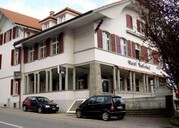
Last week I had one of the best days of my past two months! I had heard that the Salvation Army has a sector that works with refugees in Switzerland, but I was reluctant to call them because I have a hard time with their missionary mission. Since I only had two weeks left and I was getting a little restless, I decided to contact them and see what kind of work they do. It turns out that they won the bid as the official government funded entity for refugees and asylum seekers in our region. This means that they handle the cases of all the refugees here, run the centers, and distribute the money. So, they are really more of a government agency than the Salvation Army.
I spent my first day in their main office, learning about how each person who works there is assigned specific cases and they are responsible for sending them their money (9.50 CHF a day if they live in the center, or 400 CHF a month if they live in an apartment), and coordinating their transfers from phase one, where they live in the centers, to phase two, where they move into an apartment with three or four other asylum seekers. In Switzerland each case is handled individually by the Migration Board and they only after extensive interviews and background checks do they come to a decision about what kind of documents the person will get. There is N, when the decision hasn’t been made yet or when they have been denied papers, F, when they hold off on giving them papers for seven years in hope that their country will be safe for them to return home, and B, where they are allowed to stay in Switzerland and work, and C, where once they have been in Switzerland for a long time they have a few more rights. Actually getting citizenship is a very long process that only begins once you have been in Switzerland for many years. The people who work in the office also arrange the interviews with the Migration Board and keep track of what kind of documents they receive.

In the afternoon I went to help one of my coworkers with a transfer. We picked up a young single Eritrean woman from the crowded center and helped her move into an apartment with another Eritrean woman, an Ethiopian woman, and a young woman from Afghanistan. They try to put people from the same nation or region in the apartments to minimize communication challenges and any other difficulties. We showed her the room that she would share with the Afghan woman and she immediately noticed that the wardrobe didn’t have a lock on it, which distressed her. She begged my coworker, Barbara, to bring her a lock because she said she things had been stolen in the past. Barbara promised she would bring a lock next time she came. We then went through all the rules of living in an apartment, such as not to put trash down the toilet, only cook in the kitchen, when trash is collected, not to waste water and electricity, etc. We left her to settle down and when I saw her a few days later, she said things were going fine.
The organization is always looking for apartments with very low rent because they can only afford to pay about 300 CHF per person, per month. We went to visit an apartment that was in the basement of an old woman’s house and she had specifically requested that the room go to a Syrian family. We met the Syrian family there and walked through the rooms and sat for a long time afterwards drinking tea. The family had a son who had already lived in Switzerland for fifteen years and married as Swiss woman and everything. When the war broke out, his mother was killed and then he helped finance the rest of his families escape. He also served as their translator., making it much easier for them. They liked the apartment very much and will be moving in within the next month.
Working in that office is not an easy job, because you have to deal with everyone’s problems, and uncooperative Swiss neighbors, and work within a very bureaucratic frustrating system. I still found it fascinating because every day is different and you never know who or what will land in your lap.
